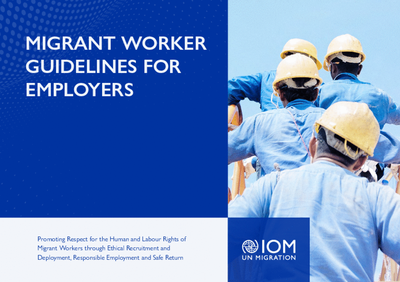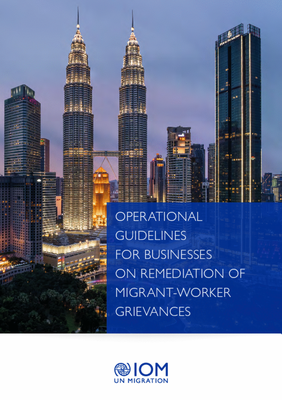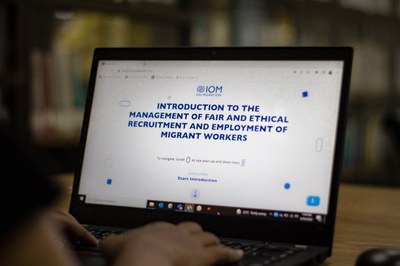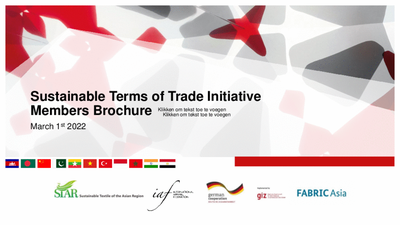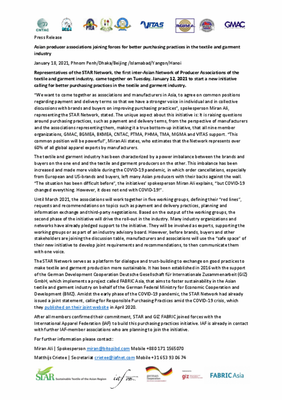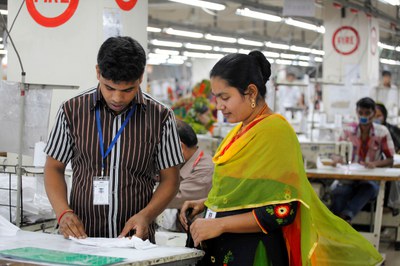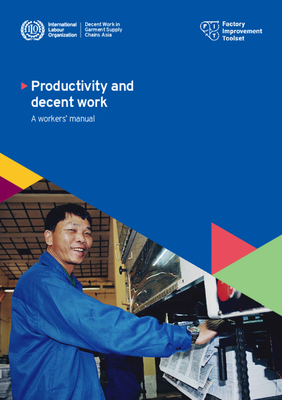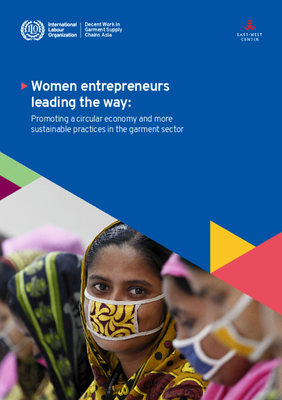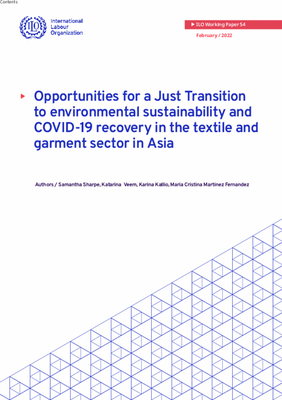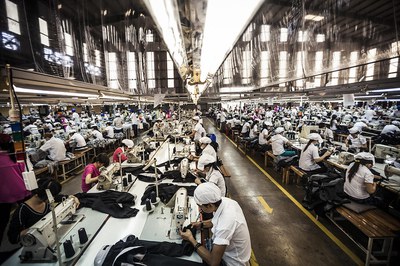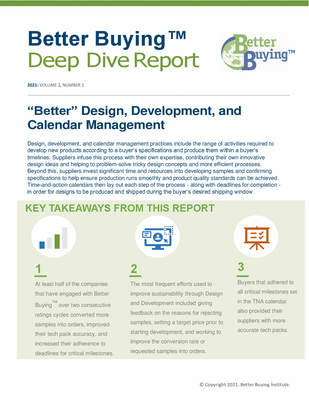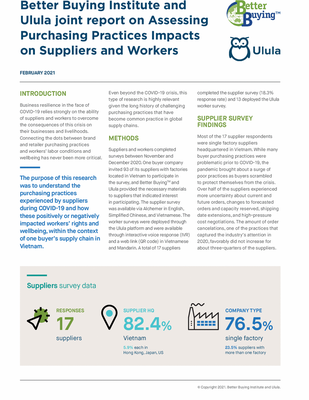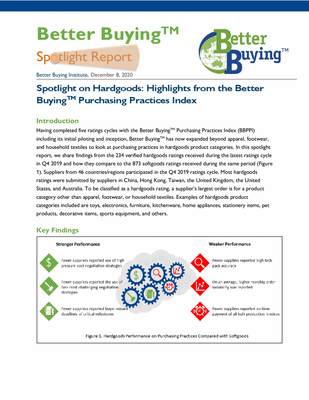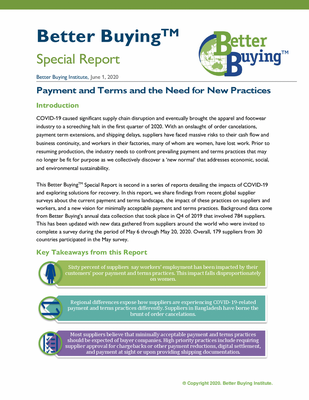IOM's Migrant Worker Guidelines for Employers
This publication is to provide practical guidance for business enterprises on how to recruit and employ international migrant workers ethically and responsibly. The guidance offers concrete steps employers across various sectors can take to run their businesses in a manner that...
View
|
Full View
|
Download
 International Organization for Migration (IOM)
|
March 22, 2022
International Organization for Migration (IOM)
|
March 22, 2022
IOM's Operational Guidelines for Businesses on Remediation of Migrant Worker Grievances
The Operational Guidelines for Businesses on Remediation of Human Rights Grievances (the “Guidelines”) are created to primarily help companies and industry groups to develop voluntary programmes to remediate worker grievances, especially with regard to addressing human rights...
View
|
Full View
|
Download
 International Organization for Migration (IOM)
|
March 22, 2022
International Organization for Migration (IOM)
|
March 22, 2022
Course: Introduction to the Management of Fair and Ethical Recruitment and Employment of Migrant Workers
This is a training course for business enterprises seeking practical guidance on how to recruit and employ migrant workers responsibly within their operations and supply chains. This module is aligned with international human rights and labour rights standards, as well as...
External Link
 International Organization for Migration (IOM)
|
April 07, 2022
International Organization for Migration (IOM)
|
April 07, 2022
STTI’s First In-Person Meeting Brings Commercial Compliance One Step Closer
22nd March, 2022. The Sustainable Terms of Trade Initiative (STTI) held its first bi-annual in-person meeting on Monday March 14th in Istanbul, Turkey and announces spokespersons.
View
|
Full View
|
Download
 Sustainable Terms of Trade Initiative (STTI)
|
June 20, 2022
Sustainable Terms of Trade Initiative (STTI)
|
June 20, 2022
Copenhagen Fashion Summit: STTI calls for responsible purchasing practices and global standardisation on due diligence
16th June 2022. STTI spokesperson and Vice President BGMEA Miran Ali called for a globally standardised approach to due diligence at the prestigious Global Fashion Summit last week.
View
|
Full View
|
Download
 Sustainable Terms of Trade Initiative (STTI)
|
June 22, 2022
Sustainable Terms of Trade Initiative (STTI)
|
June 22, 2022
Why wage digitization can help drive inclusion in the garment sector
As the transition from cash to digital financial services accelerates around the world, greater understanding is developing on how to manage this shift, what is needed to deliver impact, and the importance of increased collaboration across private and public sectors.
Read More
 Ella Moffat
|
April 26, 2022
Ella Moffat
|
April 26, 2022
Productivity and decent work: A workers' manual
This innovative new manual aims to guide worker-oriented training in the garment sector. It shows how worker engagement in productivity improvements can support decent work through enhanced social dialogue, stronger labour compliance, and improved working conditions. Published...
View
|
Full View
|
Download
 Decent Work in Garment Supply Chains Asia (ILO)
|
August 05, 2022
Decent Work in Garment Supply Chains Asia (ILO)
|
August 05, 2022
Women entrepreneurs leading the way: Promoting a circular economy and more sustainable practices in the garment sector
The report outlines four women leaders in Asia’s garment and textile sector who are making positive contributions to sector-specific challenges related to gender equality, environmental sustainability and industry recovery from COVID-19. The entrepreneurs share their personal and...
View
|
Full View
|
Download
 Decent Work in Garment Supply Chains Asia (ILO)
|
August 08, 2022
Decent Work in Garment Supply Chains Asia (ILO)
|
August 08, 2022
Opportunities for a Just Transition to environmental sustainability and COVID-19 recovery in the textile and garment sector in Asia
A Just Transition for the garment industry in Asia is critical as the sector seeks to recover from the impacts of COVID-19. This report examines the impact of the COVID-19 pandemic on the textile and garment sector, specifically the employment and enterprise impacts, and...
View
|
Full View
|
Download
 Decent Work in Garment Supply Chains Asia (ILO)
|
August 08, 2022
Decent Work in Garment Supply Chains Asia (ILO)
|
August 08, 2022
Asia still ‘garment factory of the world’ yet faces numerous challenges as industry evolves
A new report from the International Labour Organization (ILO) highlights trends in employment, wages and productivity the Asian garment, footwear and textiles industry.
Read More
 Decent Work in Garment Supply Chains Asia (ILO)
|
August 08, 2022
Decent Work in Garment Supply Chains Asia (ILO)
|
August 08, 2022
Deep Dive: “Better” Design, Development, and Calendar Management
A deep dive into the financial, social and environmental impacts on suppliers in global supply chains of design, development and calendar management practices on the part of buyers, with recommendations for buyers on how to improve.
View
|
Full View
|
Download
 Better Buying Institute
|
August 10, 2021
Better Buying Institute
|
August 10, 2021
Better Buying Institute and Ulula joint report on Assessing Purchasing Practices Impacts on Suppliers and Workers
A report on a joint piece of research aimed at understanding the purchasing practices experienced by suppliers during COVID-19 and how these positively or negatively impacted workers’ rights and wellbeing, within the context of one buyer’s supply chain in Vietnam.
View
|
Full View
|
Download
 Better Buying Institute
|
August 10, 2021
Better Buying Institute
|
August 10, 2021
Spotlight on Hardgoods: Highlights from the Better BuyingTM Purchasing Practices Index
In this spotlight report, Better BuyingTM shares findings from the 234 verified hardgoods ratings received during the latest ratings cycle in Q4 2019 and how they compare to the 873 softgoods ratings received during the same period.
View
|
Full View
|
Download
 Better Buying Institute
|
August 10, 2021
Better Buying Institute
|
August 10, 2021
Payment and Terms and the Need for New Practices
The second in a series of reports detailing the impacts of COVID-19 and exploring solutions for recovery. In this report, we share findings from recent global supplier surveys about the current payment and terms landscape, the impact of these practices on suppliers and workers,...
View
|
Full View
|
Download
 Better Buying Institute
|
August 10, 2021
Better Buying Institute
|
August 10, 2021
